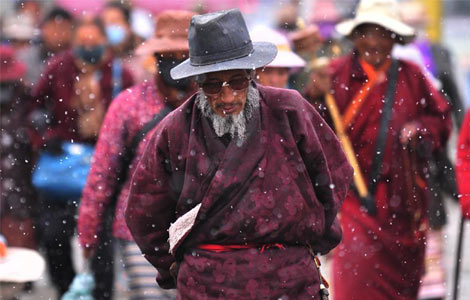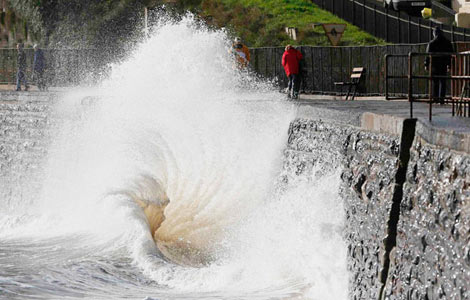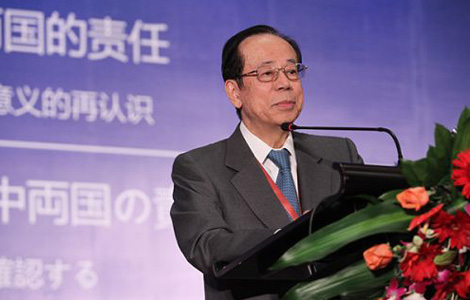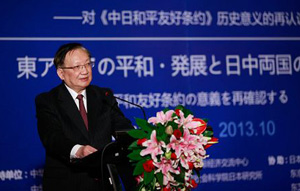Is Obama’s lack of transparency really his fault?
Updated: 2013-10-29 08:54
By ZHANG YUWEI (China Daily USA)
|
||||||||
Following his re-election to a second term, President Barack Obama has been facing pressure on a number of fronts — government shutdown, budget talks, Obamacare — the list goes on. A recent report published by the Committee to Protect Journalists (CPJ) adds one more item to the list, criticizing the administration’s inability to keep its promise to have a transparent government and to provide adequate access to government information to the press.
The report — entitled The Obama Administration and the Press: Leak Investigations and Surveillance in Post-9/11 America ¬— was written by Leonard Downie Jr, vice-president-at-large of CPJ and former executive editor of The Washington Post for 17 years. The report is the first of this kind published in the 32-year history of the CPJ, a New York-based advocacy organization supporting journalists worldwide.
Downie, a veteran journalist who helped supervise the Post’s historic Watergate coverage, spoke to more than 30 current and past journalists from various news organizations who have covered Washington to get their views on the current administration’s transparency record.
The interviewees, according to Dwonie, “could not remember any precedent” to the Obama administration’s aggressive crackdown on leaks and efforts to block information from the press.
The report mentioned an “insider threat program” that’s being implemented in every government department requiring all federal employees to help prevent unauthorized disclosures of information by monitoring the behavior of their colleagues.
The report examined a range of current administration measures that hinder government transparency, including the use of the Espionage Act in blocking media leaks, violations of the Freedom of Information Act, excessive government document classification as secrets, and government surveillance that threatens the safety and integrity of news sources.
“In the Obama administration’s Washington, government officials are increasingly afraid to talk to the press,” wrote Downie. “Those suspected of discussing with reporters anything that the government has classified as secret are subject to investigation, including lie-detector tests and scrutiny of their telephone and e-mail records.”
“When government officials are reluctant to discuss even unclassified information because they fear leak investigations and government surveillance, that is a serious problem — not only for reporters, but for American citizens,” said Jon Taylor, a political science professor at the University of St Thomas in Houston.
The report pointed out that Obama, who during his 2008 campaign had criticized the “excessive secrecy” of the Bush administration, came into the Oval Office promising an unprecedentedly open government.
But by the end of his first full day there on January 21, 2009, said the report, the President had issued directives to government agencies to speed up their responses to Freedom of Information Act requests and to establish an Open Government Initiative website with information about their activities and the data they collect.
“I find it rather amusing that Obama, while running for president in 2008, blasted the Bush administration for ‘excessive secrecy’,” said Taylor. “Obama makes Bush look like an amateur when it comes to whistle blowing and surveillance.
“Here we have an American president who often invokes human rights by playing the morality card, taking the prosecution of leakers to extraordinary levels and pursuing a massive electronic surveillance program, one that has had a chilling effect on reporters’ attempts to gather news and to hold the Obama Administration accountable,” said Taylor.
Obama administration spokesman Eric Schultz in a statement to Politico, however, defended the government’s transparency record, saying the administration has provided “unprecedented openness in government”.
Schultz said the administration has provided information that is “more than just statistics”.
“Over the past four years, Federal agencies have gone to great efforts to make government more transparent and more accessible than ever, to provide people with information that they can use in their daily lives,” said Schultz. “Just this past year, the government processed more [Freedom of Information Act] requests, decreased the backlog, improved average processing times, and disclosed more information proactively.”
While acknowledging the incidents described in the report, Ann Lee, an economics professor with New York University and author of What the US can Learn from China, wondered if the massive government machinery is growing into something that is beyond the control of any president.
“I do not know if the worsening situation to a free press and other infringements on American liberty and rights is coming directly from the Obama Administration or whether the massive government machinery is just growing more powerful on its own and is beyond the control of President Obama or any president for that matter,” said Lee. “I suspect that it is the latter case, and President Obama has no choice but to go along with whatever the powers behind the scenes tell him to do.
“Many insiders in Washington, which include the NSA (National Security Agency) officers, military officers and CIA, have been in their positions for years, if not their entire careers,” Lee added.
Contact the writer at yuweizhang@chinadailyusa.com
 ABC apologizes for 'Kimmel' joke
ABC apologizes for 'Kimmel' joke
 Snowfall hits many areas of Tibet
Snowfall hits many areas of Tibet  Lang Lang named UN Messenger of Peace
Lang Lang named UN Messenger of Peace Antiquated ideas source of Abe strategy
Antiquated ideas source of Abe strategy
 Storm wrecks havoc in S Britain, leaving 4 dead
Storm wrecks havoc in S Britain, leaving 4 dead
 Women's congress aims to close income gap, lift status
Women's congress aims to close income gap, lift status
 Sao Paulo Fashion Week held in Brazil
Sao Paulo Fashion Week held in Brazil
 Serena beats Li Na for WTA title
Serena beats Li Na for WTA title
Most Viewed
Editor's Picks

|

|

|

|

|

|
Today's Top News
Is Obama’s lack of transparency really his fault?
San Diego Symphony debuts at Carnegie
Lang Lang takes on UN `Messenger of Peace’ role
At 72, China’s ‘Liberace’ still wows fans
Penn State: 26 people get $59.7m over Sandusky
China providing space training
Miscommunication causes conflicts
ABC apologizes for 'Kimmel' joke
US Weekly

|

|






